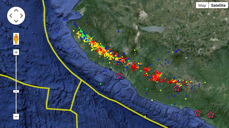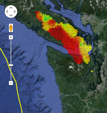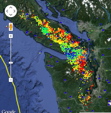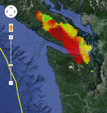World Tremor DataBase

Welcome to the World's Tremor
Database Website! This web site manages tremor catalogs worldwide, and
distributes into the public. The automatic detection and the source location of
tremors are made by the envelope correlation method using horizontal waveforms
by Ide (2010).
In this web-site we have compiled the tremor catalogs for the
following regions: Nankai, Kyushu, Cascadia, Parkfield, Jalisco-Colima
(Mexico), Guerrero (Mexico), southern Chile, Manawatu (New Zealand), and
Taiwan. Pink-patched areas in this database show the studied tectonic tremor
zones in those studies (other suspicious signals are excluded). "Clustering"
extracts a clustered tremor activity having two or more events within a
space-time window defined by epicentral distance of 10 km and time difference
of 1 hour (After Ide, 2012).
You can download each of the tremor source data in this web-site with "CSV" format. The format of our CSV file is as follows.
| 1. Source origin date |
| 2. Source origin time (Japan: JST=UTC+9, others UTC) |
| 3. Latitude (deg) |
| 4. Longitude (deg) |
| 5. Depth (km) |
| 6. Mw |
| 7. Source duration [sec] (We adopt > 10 sec) |
| 8. Residual error [sec] (We adopt < 1.5 sec) |
| 9. Optional: Origin date & time with mili-seconds |
Please cite the following paper as a reference:
Idehara, K., Yabe, S., and Ide, S. Regional and global variations in the temporal clustering of tectonic tremor activity, Earth, Planets and Space, 2014, 66, 66, doi:10.1186/1880-5981-66-66, 2014.
References:
Ide, S., (2010), Striations,
duration, migration and tidal response in deep tremor, Nature, 466, 356-359,
doi:10.1038/nature09251.
Ide, S., (2012), Variety and spatial heterogeneity of tectonic tremor
worldwide, J. Geophys. Res., 117, do:10.1029/2011JB008840.
WELCOME TO THE WORLD TREMOR DATABASE!
(2004/4/1–2013/3/31)
(2004/4/1–2013/3/31)
(2005/1/1–2014/12/31)
(2005/1/1–2012/12/31)
(2006/1/26-2007/6/9)
(2005/1/1-2007/6/6)
(2009/11/26-2013/8/17)
(2004/5/1-2012/4/30)
(2006/1/1-2009/12/31)
(2005/1/1-2007/2/28)






CATALOGS
LINKS
Left: Temporal migration of tectonic tremors in Nankai, Japan, for 30 days from May 1, 2009. Colder colors represent earlier tremors, while warmer colors show later ones. Right top: Depth variation of tremors in Jalisco–Colima, Mexico. Colder colors show shallower events while warmer colors denote deeper. Right bottom: (Left side) Depth variation of tremors in Cascadia. (Right side) Characteristic recurrence interval of tremors in Cascadia. Warmer colors show longer characteristic time periods, while colder colors represent shorter.
